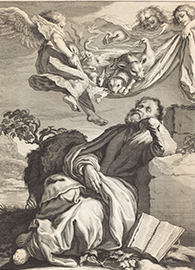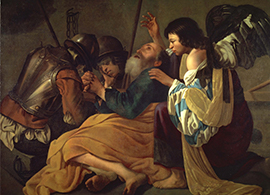Acts Week 6
On Second Thought: Acts 10–12
By Jack Levison
W. J. A. Power Professor of Old Testament and Biblical Hebrew, Southern Methodist University
Read this week’s Scripture: Acts 10-12
19:29

 Enlarge
Enlarge
Yentl God
What, I should teach you Yiddish? You want I should call God a traffic cop instead? Oy veh! What should I care anyway? Just so you know what God does in the book of Acts. That’s all I care.
Oops. Sometimes I slip into the Long Island (oh, go ahead and say it, I know you want to — Lawn Guy-land) of my youth, when I ate Hanukkah cookies at the Berensons’ next-door. Still, I won’t apologize. Backsliding is good when it helps you to see God as a yentl, a matchmaker.
If you think God works in individuals — Christ in me, the hope of glory (Colossians 1:27) — or in the church as a whole — let’s say, in worship or outreach — then you’ll see something new in today’s tale: God directs in tandem, two by two.
The story starts with a pious Roman centurion in Caesarea, Cornelius by name, who, at three o’clock one afternoon, “had a vision in which he clearly saw an angel of God coming in,” telling him to send men to Peter in Joppa. Cornelius stands to attention, and sends two slaves and a devout soldier to find Peter in Joppa (Acts 10:1–8).
About 21 hours later, Jerusalem church leader Peter heads to the roof to pray; he also has a vision. The small detail, Peter was praying, is a reminder that daily discipline is the basis for a startling and world-changing experience of the spirit, which is about to happen (Acts 10:9–16).
While Peter is puzzling over what to make of his vision, the men sent by Cornelius arrive at the door and ask for Peter (10:17–18). “[T]he spirit said to him, ‘Look, three men are searching for you. Now get up, go down, and go with them without hesitation; for I have sent them’” (10:19–20). No time for musing here; the spirit has practical orders to deliver. God’s spirit is directing traffic, choreographing a divine dance — sticking a celestial nose into the lives of receptive, faithful people.
There is nothing really new here. God is a yentl, bringing together just the right people. Recall Saul and Ananias (9:6; 9:11), who had tandem visions that linked them. And don’t forget the instructions Philip received, to head to a certain road (Acts 8:26) and a particular chariot on that road (8:29), where he sat side by side with an eager Ethiopian eunuch.
Now back to where we started. Yes, God works in individuals and the church as a whole. But to think God leads people to one another is a little different, and perhaps a little disturbing. If I believe this, I need to train my ears to listen beyond the din of preachers, professors, laptops, cell phones, and Costco runs. I even need to be ready for visions! Peter was praying. Cornelius was devout — a code word for “disciplined in his devotion.” Both were poised to hear God. And hear God they did.
On Second Thought
Peter is “greatly puzzled” (10:17) by his vision, in which God commands him three times to eat unclean foods. This verb, puzzled, is important. Peter doesn’t bask in physical transport or emotional catharsis or miraculous ecstasy. Peter wants meaning.
Meaning dawns on Peter — though only when he is willing to take daring steps and follow the men at his door. So the spirit tells Peter to “go with them without hesitation” (10:20). Something new is afoot, and Peter must not enter it with his feet dragging.
That’s just the beginning of the change in Peter. The participle translated hesitation (diakrinomenos) in Acts 10:20 can also mean discriminating, and this is how Peter understood the spirit’s word after he travelled to Caesarea, where he unexpectedly saw the holy spirit poured out on Gentiles — non-Jews — who spoke in tongues and praised God. Peter returns to Jerusalem and retells the story to the Jewish followers of Jesus there: “The spirit told me to go with them without discriminating between them and us” (11:12; my translation).
Notice that Peter adopts the same Greek verb, diakrinein, but with a different meaning. Now Peter understands that the spirit hasn’t told him to get up and go without hesitating, but has told him to get up and go without discriminating between Jews and non-Jews, between the believers in Jerusalem and those in Caesarea. [Author’s Note 1]
Peter provides a remarkable model of keeping faith. He doesn’t take a conservative approach to revelation. He doesn’t grasp, white-knuckled, the command to go without hesitating (Acts 10:20). He realizes later that the spirit has actually commanded him to go without discriminating between Jews like himself and Cornelius’ slaves and soldier (11:12). This model of keeping faith means we needn’t grip our faith so tightly that we wring its neck. A good faith is a supple faith, a malleable faith, a faith that grows — even changes — in the face of new experiences.
Déjà Vu All Over Again
Notice another change in Peter’s take on his vision. The vision was about eating food; three times a food-filled blanket came down from heaven. But his interpretation is about eating with people. Not pork, but people — that’s the point of the vision. Why the change?
Because God has given the holy spirit to Gentiles. Fickle folk, at least in the eyes of Torah-abiding Jewish followers of Jesus. And the spirit has come to them, Peter recalls, just as the holy spirit came to Jesus’ followers at the first Pentecost (Acts 15:8). While Peter was speaking, “the Holy Spirit fell upon all who heard the word. The circumcised believers who had come with Peter were astonished that the gift of the Holy Spirit had been poured out even on the Gentiles, for they heard them speaking in tongues and extolling [praising] God” (10:44–46).
This is Pentecost revisited — or what we might call a pagan Pentecost. Peter and his Jewish companions hear Cornelius and his Gentile friends “speaking in tongues and praising God” (Acts 10:46; my translation). This brief reference to tongues and praise takes us back to God’s praiseworthy acts at Pentecost, which Jesus’ earliest followers spoke in dialects of the Roman world; in fact, the verb “to praise,” megalunein, in Acts 10:46, shares the same root with the noun, “praiseworthy acts,” ta megaleia, in Acts 2:11.
For the second time in the history of the church, speaking in tongues is not an incomprehensible activity — it’s one that has clear and concrete content: the praiseworthy acts of God. For the second time, bystanders understand what recipients of the spirit are saying when they speak in tongues.
I, perhaps like you, am tempted to press God for a moment of tongues-speaking, a flash of ecstasy, a split second of rapture. Yet not even the early church gets to experience this sort of miracle. Whenever there is rapture, ecstasy, speaking in tongues, there is always clear content rooted in Israel’s history. There is always verbal witness, lucid testimony to the praiseworthy acts of God.
The holy spirit comes to believers not to make them feel good, but to make them a sustained source of testimony to Jesus. That, in a nutshell, is the theme of Acts 1:8: the spirit will come upon you, and you will be my witnesses to earth’s ends.

 Enlarge
Enlarge
Too Good to Be True
There’s no time, however, for celebration. The hard edge of Roman politics cuts through — quite literally — the joy of the early church. A certain church leader, James, is arrested and “killed with the sword” (Acts 12:2). No harder political edge than the executor’s sword.
King Herod Agrippa I, seeing that many in Jerusalem like this move, arrests Peter to kill him, too, though — in the utter hypocrisy of piety — only after the feast of Passover is over. Royal murder, ironically, just won’t do during a feast celebrating the liberation of Israelite slaves from the tyranny of murderous Egyptian royalty! So Herod waits.
God doesn’t. God performs a miniature exodus. The Greek, exodos, means “way out,” and that is exactly what Peter gets: his own little exodus smack dab in the middle of Passover, which celebrates the exodus from Egypt. The miracle is remarkable, and I find myself wondering whether Luke knows he’s stretching the boundaries of our credulity. Will one miracle more take us to the world of fantasy rather than faith? So Luke establishes that this happened, really happened, step by surprising step.
Read, therefore, the story in Acts 12:6–17, slowly. Very slowly. Notice this: the angel pokes a somnolent Peter in the side, whispers, “Get up quickly,” and gives practical orders, the kind you’d give to a three year old — or an especially groggy grown-up: “Fasten your belt and put on your sandals … Wrap you cloak around you and follow me” (12:7–8). It takes Peter a while to figure out that this is another miracle, another wonder on earth below, but he finally does. Luke tells us that Peter “did not realize that what was happening with the angel’s help was real; he thought he was seeing a vision” (12:9).
Another clue that we are on the precipice of the unbelievable: Peter heads to Mary’s house, where everyone is praying for his release. A maid, Rhoda, comes to the door, recognizes Peter’s voice, leaves him standing there, exposed to Roman recognizance and rumor, and tells everyone “that Peter was standing at the gate” (12:14). The group — interrupted as they pray for Peter’s release — don’t believe he’s released. “You are out of your mind,” they protest (12:12–15). They have prayed for this; they just don’t believe it when it happens.
There are some things in Acts — in life — that are too wonderful to be real. This is one of them. Peter doesn’t realize at first that this is happening, and the people praying for him can’t accept God’s “yes” either. It’s just too good to be true. But occasionally, once in a while, it is true. It wasn’t for James, who fell to Roman brutality, or for many humans who fall to human tyranny; but for Peter, for reasons we cannot know, there was a private exodus in store.
The almost unbelievable story of Peter’s escape is followed by another tale that seems too convenient, too expedient, to be true. Herod, who had killed James and imprisoned Peter, loved it too much when people called him god, so “an angel of the Lord struck him down, and he was eaten by worms and died” (Acts 12:20–23). Oh, please! This is the stuff of legend. Is Luke making it up?
No, in fact, he’s not. This is one of the stories in the book of Acts that other historians corroborated. Josephus, writing in the late first century, told a similar story of Herod’s death. The morning sun, Josephus writes, gleamed off Herod’s silver garment as he entered the Roman theatre in Caesarea. The people, as in Acts, addressed him as a god — worship that Herod should have rejected but didn’t. So he “felt a stab of pain in his heart. He was also gripped in his stomach by an ache that he felt everywhere at once.” Soon “he was overcome by more intense pain” and died (Jewish Antiquities 19.344–50).
What’s to be learned here? This, I suppose: We don’t possess the gold standard of truth. Left to our own devices, we might think Luke invented this story about death-by-worms to create a balance between Herod’s crime and punishment. It’s just so convenient — and pleasantly gruesome. But Luke didn’t make it up. So we need more than our own historical criteria to make judgments about 2,000-year-old texts.
A Modest Miracle
Sandwiched between two momentous miracles — the one consisting of a dramatic outpouring of the holy spirit on ethnic outsiders, the other consisting of a celestial guide out of prison — is a more pedestrian story, but not one, for that reason, any less remarkable. Knowing what we know of churches, of communities in general, what’s not miraculous about a church that is rife with eager learning, wide open to fresh revelation, and rich in generosity? And these are precisely what made the church in Antioch so special.
A band of persecuted believers travelled to Antioch and had enormous success, so the head church in Jerusalem sent Barnabas, who fetched Saul (soon to be Paul) and brought him to Antioch, where, “for an entire year they met with the church and taught a great many people, and it was in Antioch that the disciples were first called ‘Christians’” (Acts 11:22–26). Intense learning for an entire year.
Besides Barnabas, “prophets came down from Jerusalem to Antioch” (11:27). One named Agabus stood up and predicted a severe famine around Jerusalem (11:28). You’d think the church in Antioch, itself full of refugees from persecution, might respond to this prophecy by protesting that their own needs should be met first.
They did not. They responded with extravagance. “The disciples determined that according to their ability, each would send relief to the believers living in Judea; this they did, sending it to the elders by Barnabas and Saul” (11:29–30). The church in Antioch didn’t blink or wait for a famine to hit before responding, before calculating how much the believers in Jerusalem might need. They gave before there was a famine.
Compare this mass of unnamed folk with King Herod Agrippa I. For the politically savvy Roman ruler Herod, who had executed James, food was a political weapon. Tyre and Sidon had to cozy up to him to get what food they needed (Acts 12:20). The church at Antioch adopted another strategy: turning swords into plows and rendering food a free gift.
In light of Week 1 of this Lectio, consider the ground we covered today. It’s dizzying. We’ve rediscovered:
- Signs and wonders, from visions to angelic escapades.
- The hard edge of Roman politics, from outstretched swords to heavily guarded prisons.
- Unnamed people who pulse with a love of learning, an ear for prophecy, and extreme generosity. We’ll pick up next week with these anonymous believers, whose virtues we’ve only just begun to unpack.
Questions for Further Reflection
- Our text for this week begins with an encounter between Peter and Cornelius. What conditions led to this encounter? How might you cultivate a similar spirit that is, as Dr. Levison says, “poised to hear God?”
- Put yourself in Peter shoes following the events of 10:1–33. What might he have been thinking or feeling as a result of his vision and encounter with Cornelius? What is notable about how he reacts to what he has seen and heard, and how might this challenge our interactions with people who are perceived as outsiders in contemporary culture?
- The “pagan Pentecost” in 10:44–48 represents another surprising movement of God in the book of Acts. In what ways has God surprised you in your own journey of faith? Do these kinds of events have an impact on how you approach your day to day discipleship?
- Re-read 12:1–18. What stands out to you from this miraculous account? As Dr. Levison notes, sometimes when we pray for something and God answers our prayer, the answer seems too good to be true, so we don’t recognize it. Has this ever happened to you or someone you know? What do you think it says about the state of our faith?
<<Previous Lectio Back to Acts Next Lectio>>

This work is licensed under a Creative Commons License.




